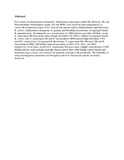Laboratory Evaluation of Pathogenicity of Entomogenous Nematodes to African Tick Species

View/
Date
2000Author
Kaaya Godwin P.
Michael S.
Itamar G.
Type
ArticleLanguage
enMetadata
Show full item recordAbstract
Five strains of entomogenous nematodes, Steinernema carpocapsæ strains DD, Mexican, SR, and Heterorhabditis bacteriophora strains 1S5 and HP88, were tested for their pathogenicity to various developmental stages of five African tick species namely; Rhipicephalus appendiculatus, R. evertsi, Amblyomma variegatum, A. gemma, and Boophilus decoloratus. In engorged female R. appendiculatus, all nematodes at a concentration of 1,000 infective juveniles (IJ)/dish, except S. carpocapsæ Mexican strain, induced high mortalities (56-100%), whereas in engorged female R. evertsi, only S. carpocapsæ DD and H. bacteriophora HP88 induced high mortalities (78% and 56%, respectively). In engorged B. decoloratus, S. carpocapsæ DD, Mexican, SR and H. bacteriophora HP88 (100 IJ/dish) induced mortalities of 85%, 65%, 80%, and 100%, respectively. In all cases, except for S. carpocapsæ Mexican strain, a higher concentration (5,000 IJ/dish) did not result in higher mortality than occurred with 1,000 IJ/dish. Unfed females and immature stages of ticks were found to be generally resistant to the nematodes. The feasibility of using entomogenous nematodes for biological control of African tick species are briefly discussed.
URI
http://www.ncbi.nlm.nih.gov/pubmed/11193637http://erepository.uonbi.ac.ke:8080/xmlui/handle/123456789/35206
Citation
Annals Of The New York Academy Of Sciences Volume 916, Tropical Veterinary Diseases: Control And Prevention In The Context Of The New World Order Pages 303–308, December 2000Publisher
University of Nairobi. School of Biological Sciences
